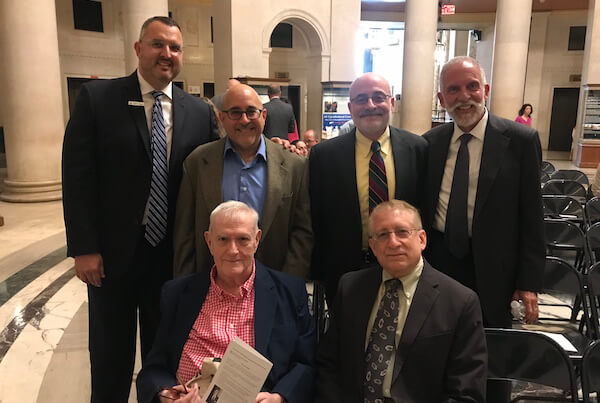In an April 26 ruling that received surprised comment from the media, the New York Court of Appeals affirmed by a 6-1 vote a decision by Kings County Supreme Court Justice Vincent Del Giudice to assign sufficient points under the state’s Sex Offender Registration Act to a man acquitted of all the felony sex crimes charges against him to place him in the category of a level 2 sex offender, which requires lifetime registration and other restrictions under SORA.
The defendant, Quinn Britton, then 44, was charged with first-degree rape, two counts of criminal sexual act in the first degree (felony charges), and one count of second-degree sexual abuse (a misdemeanor charge). The charges, based largely on the testimony of Britton’s teenage niece, stemmed from a Thanksgiving 2011 visit by the victim and her mother to the victim’s grandmother, who is Britton’s mother. The claim is that the grandmother dosed off and the defendant invited the 13-year-old victim into his bedroom, where he induced her to undress, fondled and kissed her breasts, performed oral sex on her, had penetrative sex with her, and then had her perform oral sex on him.
The victim’s older brother testified that she came to him upset the following month and told him about the incident, although her account on that occasion said that defendant “attempted” to have penetrative sex but could not because his penis “wouldn’t fit.” The police were notified, and a detective made notes of statements the defendant made after waiving his Miranda rights, but there is no signed confession and the notes differ from the victim’s account. The only sexual acts to which the defendant clearly admitted were fondling and kissing the victim’s breasts, the subject of the misdemeanor charge. All of the other evidence presented at trial was circumstantial, there was no physical evidence of sexual assault, and the case came down to “she said, he said.”
Judge points to “clear and convincing evidence” of crimes jury didn’t find
The jury struggled with the case, sending out three notes concerning deadlock — an inability to reach a verdict — but ultimately convicted on the misdemeanor charge and acquitted on the felony charges. At the subsequent sentencing and SORA hearing, Justice Del Giudice announced that based on the victim’s grand jury and trial testimony, he found “clear and convincing evidence” that the defendant engaged in the charged conduct for which he had been acquitted by the jury, and assigned 25 points on the SORA scale, which put Britton into the level 2 offender category, mandating lifetime registration and other restrictions.
On appeal, Britton protested that the acquittal meant that the jury had chosen to credit his testimony and to reject that of the victim, so there could not be a finding of clear and convincing evidence that he committed the charged acts.
The Appellate Division in Brooklyn, however, affirmed, noting that “clear and convincing evidence,” a civil standard of proof, is a less demanding standard than “proof beyond reasonable doubt” required for a criminal conviction, and that New York precedents allow judges to assign SORA points based on grand jury testimony and trial testimony that had not convinced the jury of criminal guilt.
The Court of Appeals affirmed in a one-paragraph memorandum, stating “Contrary to defendant’s argument, his acquittal of charges at his criminal trial relating to such conduct does not foreclose the hearing court from finding, by clear and convincing evidence, that he engaged in such acts.”
The court provided no further explanation, and did not respond to the lengthy dissenting opinion by Judge Jenny Rivera, who contended that the prosecution “failed” to meet the “heavy burden” of showing by “clear and convincing evidence” that the defendant had engaged in the felony conduct of which he was charged but not convicted.
“Defendant’s trial turned on competing narratives of the complainant and the defendant as the People had no physical evidence or eyewitnesses to the crimes charged,” wrote Rivera. “Despite the acquittal of the felony charges, the SORA court assessed defendant points for having committed the specific conduct on which these charges were based. On the particular facts of this case, in which the only evidence of the conduct for which defendant was assessed these points was rejected by the jury, the SORA court erred in finding clear and convincing evidence of the alleged sexual contact. Therefore, I would reverse the order adjudicating defendant a risk level two offender, and dissent from the majority’s contrary determination on this appeal.”
In support of her dissent, Rivera noted that cases cited by the court in support of its decision were not really on point because they involved situations where the defendants entered guilty pleas and the record upon which the SORA court had to rely in assigning points was necessarily based on grand jury testimony and victim statements that were not made in court under oath and subject to cross-examination. This case is different; the victim’s testimony was subject to cross-examination and failed to persuade the jury.
Underlying this odd situation is the absurd contention that requiring somebody to register for the Sex Offender Registry is not “punishment,” a position that the US Supreme Court has taken in cases rejecting constitutional challenges to state sex offender registration acts. Although New York’s SORA is not as draconian as some other states’ registration laws, since it doesn’t impose stringent residential and occupational restrictions, it still exposes a level 2 or 3 registrant to the risks inherent in having their name, photograph, and contact information posted on a website accessible to the public, making them targets for social ostracism, employment and housing discrimination, and even physical attacks, and requires them to notify local officials should they travel or move across state lines, potentially subjecting them to the more restrictive requirements imposed by other states.
That a man could be subjected to such requirements after a jury acquitted him of the charges on which they are based is indeed startling, but the Supreme Court has rejected the argument that the Constitution requires more in the way of due process before people can be subjected to mandatory registration.
Britton was represented on appeal by Denise A. Corsi.































